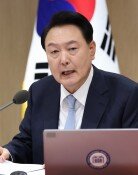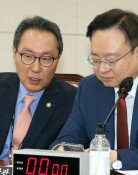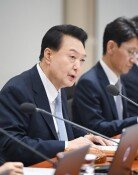Presidential office's deceitful offer
Presidential office's deceitful offer
Posted February. 25, 2019 07:48,
Updated February. 25, 2019 07:48
Senior presidential secretary for civil affairs Cho Kuk said that if there are worries about potential probe oppressive of opposition parties, it would be possible to consider exempting elected officials including lawmakers from the targets of investigation by the high-level civil servant investigation body. The offer is apparently meant to persuade the opposition parties to help ensure the bill on the new investigation body clears the National Assembly, but it is a suggestion inappropriate at best considering that the new organization would be aimed at reforming powerful state organizations.
The establishment of the high-level civil servant investigation body is aimed at preemptively curbing collusion between the prosecution and political powers. The purpose is to create a new independent investigation body with the authority to indict high-level officials due to the prevalent suspicion that state prosecutors are not sternly investigating power elite including lawmakers, ranking government officials, and judges and prosecutors. If elected officials are excluded from investigation targets, the high-level civil servant investigation body will only become a half-functional and half-dysfunctional organization. Hence, it would be impossible to end the outdated practice in which the prosecution is influenced by the National Assembly having the right to legislate, set budget and inspect state organizations, or forms secretive deals with politicians. This will also have significantly negative impact on broader reform of the judicial branch that is meant to significantly reduce the prosecution’s power.
If there are concerns about political neutrality of the high-level investigation body, it would be proper to put in place measures to prevent such practice by enacting the necessary legal measures even if this takes time. The biggest distrust that the opposition parties have towards the proposed investigation body is that this organization could be filled with pro-government prosecutors and become an investigative authority that is even more politically impartial than the prosecution. If the government is to dispel such distrust and concerns, institutional measures designed to ensure political neutrality and independence in the body’s formation and operation including the appointment of its chief should be discussed before anything else. In the past, negative effects of the prosecution used to include senior prosecutors secretively colluding with powerful politicians to give favoritism and thereby impartially handle and investigate political cases. If the presidential office seeks to persuade the National Assembly, it would be proper for the president and the ruling party not to have the power to appoint officials in the proposed investigation body, rather than exempting lawmakers from its investigation targets. However desperate the government and ruling party is in their push to pass the bill, they will hardly win trust and support from the public if they choose to resort to deceitful measures.
Headline News
- Israel prepares for retaliation against Iran
- Samsung reclaims top spot, surpassing Apple in smartphone market
- 77% of Koreans in 20s and 30s are 'Kangaroo Tribe' due to job crisis
- KBO referees embroiled in controversy over ABS decision concealment
- Inflation, oil price surge put double shock on global economy







